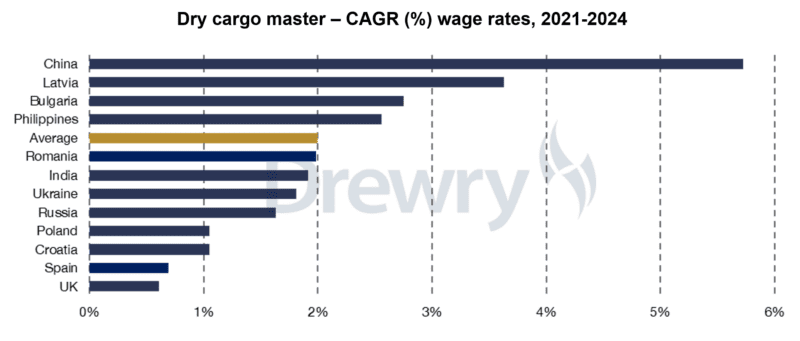
by Captain John Konrad (gCaptain) For many years, American service provider mariners have been in a state of stagnation. Regardless of their essential function in U.S. delivery and nationwide safety, wage development and dealing situations have barely improved. Whereas some progress has been made in contract negotiations, most features haven’t stored tempo with inflation. Not like the extra assertive longshoreman unions, American maritime unions, that are purported to advocate for mariners, have refused to strike—even with probably the most pro-union president in current reminiscence.
Whereas American mariners nonetheless earn extra on common than their overseas counterparts, the as soon as huge wage hole is quickly shrinking.
In stark distinction, China has been quickly advancing. Elevated wages, a rising seafaring workforce, and a authorities that acknowledges the strategic significance of maritime labor have positioned Chinese language mariners for fulfillment. In response to Drewry’s Manning Annual Evaluation and Forecast, China has seen the strongest wage development of any seafaring nation.
The USA doesn’t even present up on the dimensions of the highest 13 nations for wage development:

China’s Rising Maritime Muscle
China now ranks because the second-largest provider of seafarers for worldwide service provider delivery, making up round 11% of the worldwide maritime workforce. Nevertheless it’s not nearly numbers—Chinese language officers are more and more discovering jobs on worldwide vessels, and expert scores take pleasure in higher-than-usual wage hikes. The competitors for expert labor between the maritime and onshore sectors has pushed wages up considerably.
The Drewry report highlights that Chinese language dry cargo masters have skilled wage development exceeding 5%, in stark distinction to many years of largely stagnant wages for a lot of American mariners. China’s booming economic system continues to gas demand for maritime staff, whereas the US shrugs off funding briefly sea delivery or growth of the Jones Act fleet.
American Mariners: Left Behind by Inaction
American mariners have been treading water, trapped in a system that has did not sustain with world modifications. Complacent unions and a reluctance to push for significant reforms or name for strikes have left them with little leverage. As Chinese language mariners take pleasure in increased wages and elevated alternatives, U.S. mariners face an growing older workforce and stagnant prospects.
The state of affairs for American mariners has critical nationwide safety implications as China has militirized their mariners and as U.S. Navy’s Army Sealift Command (MSC) considers sidelining as much as 17 help ships on account of a scarcity of certified service provider mariners, in line with a report from USNI Information. This “drive technology reset” plan would place the ships into prolonged upkeep, reallocating their crews to different vessels and lowering the demand for mariners by as many as 700 positions. Among the many ships affected are two Lewis and Clark-class replenishment ships, a fleet oiler, twelve Expeditionary Quick Transports (EPFs), and two forward-deployed expeditionary sea bases that play essential roles in U.S. Central Command, European, and Africa Command operations. Whereas some MSC positions – like junior officers – have seen main pay will increase, others like grasp have hit pay ceilings.
As China surges forward with a rising and better-paid maritime workforce, the U.S. struggles to seek out sufficient mariners to employees its vital help fleet—additional illustrating the rising disparity between the 2 nations’ maritime capabilities.
A Name to Motion
If the U.S. desires to remain aggressive in world delivery, the system wants an entire overhaul—from coaching to union illustration. Unions needs to be keen to strike to get wages consistent with longshoreman unions. With out motion, the hole between American mariners and their world counterparts, notably in China, will solely develop. The clock is ticking, and continued inaction dangers leaving the U.S. maritime workforce irrelevant.
Unlock Unique Insights Immediately!
Be a part of the gCaptain Membership for curated content material, insider opinions, and vibrant group discussions.
Source link




